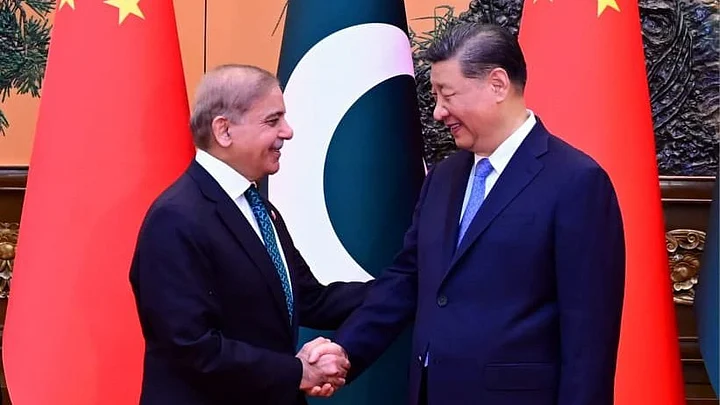Pakistani Prime Minister Shehbaz Sharif concluded his first visit to Beijing on 8 June, which was undertaken with the hope of gaining momentum on the almost stalled China–Pakistan Economic Corridor (CPEC) and some restructuring of Chinese loans and debts.
Even Pakistan's budget was put on hold awaiting the outcome of the visit. The PM was accompanied by a large number of businessmen and entrepreneurs too. However, not much was achieved and the fear of Islamabad sinking further into the Chinese debt trap remains.
Even after a decade, the CPEC has failed to positively impact the Pakistani economy. The major challenge today for it is the security of Chinese nationals working on various projects. The number of attacks on them, after all, has been consistently rising in the last few years.
Pakistan’s dependency on China has always been a major challenge for India. The year 2024 marks the fourth anniversary of the Galwan Clashes which have led to a near-total breakdown of communication between the Asian giants. Even after multiple rounds of talks, the border remains tense.
This has been made worse by China attempting to change the names of places located in the state of Arunachal Pradesh — a clear attempt at cartographic encroachment. Beijing also filled the post of its Ambassador to India after a gap of 18 months.
The complete breakdown of the confidence-building mechanisms (CBMs), along with growing Chinese inroads in South Asia, most notably the Maldives, has further put a strain on India’s diplomatic manoeuvring in the region.
China has been reiterating its commitment and friendship to Pakistan and this ‘all-weather friendship’ has proven a challenge for New Delhi. The CPEC has been a bone of contention since its inception as it directly challenges Indian sovereignty in the state of Jammu and Kashmir.
India has always been vocal regarding the unilateral decision by China and Pakistan to undertake development and investment in a contested region, i.e., Pakistan-Occupied Kashmir (PoK), which has been disputed and India considers it as its own.
As per the Joint Statement at the end of Sharif's visit, both China and Pakistan, “underscored the importance of maintaining peace and stability in South Asia, the need for resolution of all outstanding disputes, and their opposition to any unilateral action”. A clear hint at questioning India’s position on Jammu and Kashmir, and Ladakh.
As a response, Randhir Jaiswal, the spokesperson of the Indian Ministry of External Affairs said, “We have noted unwarranted references to the Union Territory of Jammu and Kashmir in the joint statement between China and Pakistan of 7 June 2024. We categorically reject such references. Our position on the issue is consistent and well-known to the concerned parties. The Union Territory of Jammu and Kashmir and the Union Territory of Ladakh have been, are and will always remain integral and inalienable parts of India. No other country has the locus standi to comment on the same”.
A very vocal attempt to assert India’s territorial integrity.
India has always asserted that its relations with China and Pakistan are based on different parameters.
S Jaishankar, who retained his post as the External Affairs Minister under the newly elected government, asserted that “both the neighbouring countries present unique challenges and India's relations with them are different,” clearly indicating that New Delhi is ready to engage with them as independent entities and that the history and characteristics of the challenges are very different.
With Pakistan, it is cross-border terrorism, and when it comes to Beijing, the issues are territorial.
The Joint Statement only underscores Pakistan's lack of independent thought when it comes to its position in South Asia and its relations with India. Given the extent of debt which Islamabad owes to Beijing, it is becoming increasingly clear that it will be further playing second fiddle to China’s aspirations in the region.
Pakistan needs Chinese investments and consistent bailouts, and in exchange, Beijing will be gaining further foothold and control on its territory (Gwadar Port), and its foreign policymaking.
All of this also underscores the dual standard that Beijing follows towards territorial issues. It is very concerned and adamant that it will have diplomatic relations with only those countries which respect the One China Principle. However, it has never shied away from commenting on the territorial dispute between India and Pakistan, while asserting that no third nation should fiddle with its territorial issues. On territorial nationalism, China is only concerned about its own.
After all, China had made similar comments after India abrogated Article 370 and asserted that India had illegally set up the Union Territory of Ladakh. The Chinese Foreign Ministry spokesperson had argued, “China has never recognised the so-called union territory of Ladakh set up unilaterally and illegally by India”.
(Dr Gunjan Singh is an Associate Professor at Jindal Law School, OP Jindal Global University. Her research interests are in the fields of Chinese Foreign Policy, China-South Asia Relations, Domestic Politics in China, Chinese Media, Mainland-Taiwan Relations and Space Security. This is an opinion piece and the views expressed are the author’s own. The Quint neither endorses nor is responsible for them.)
(At The Quint, we question everything. Play an active role in shaping our journalism by becoming a member today.)
